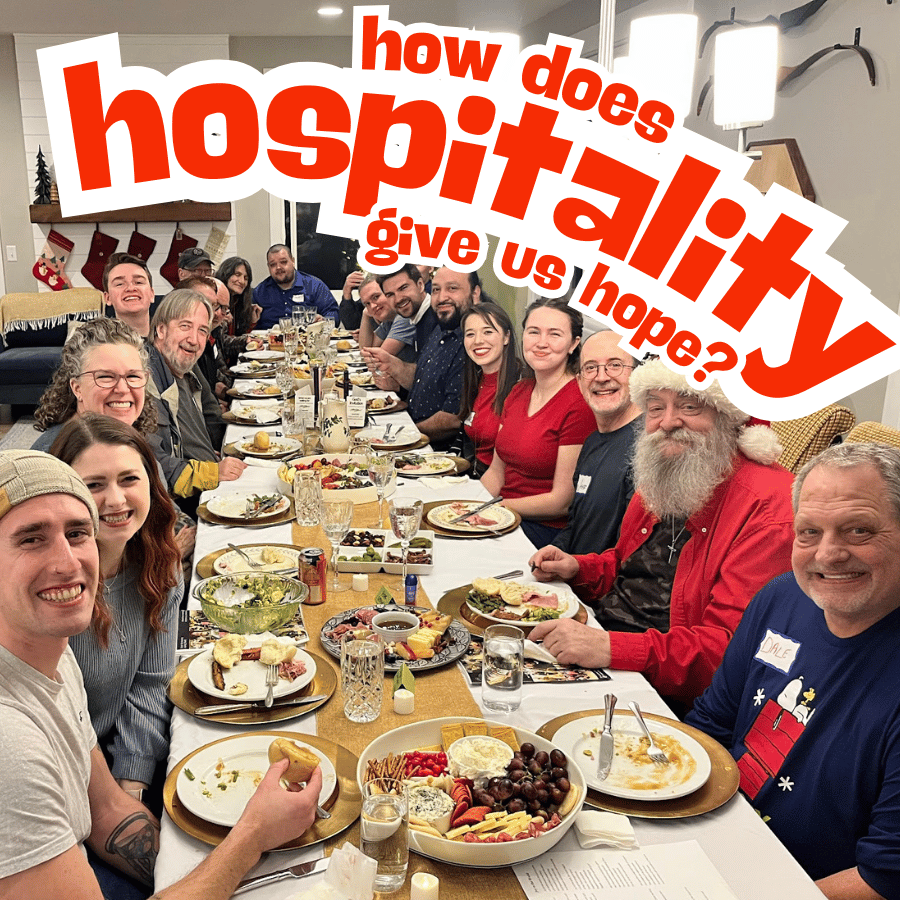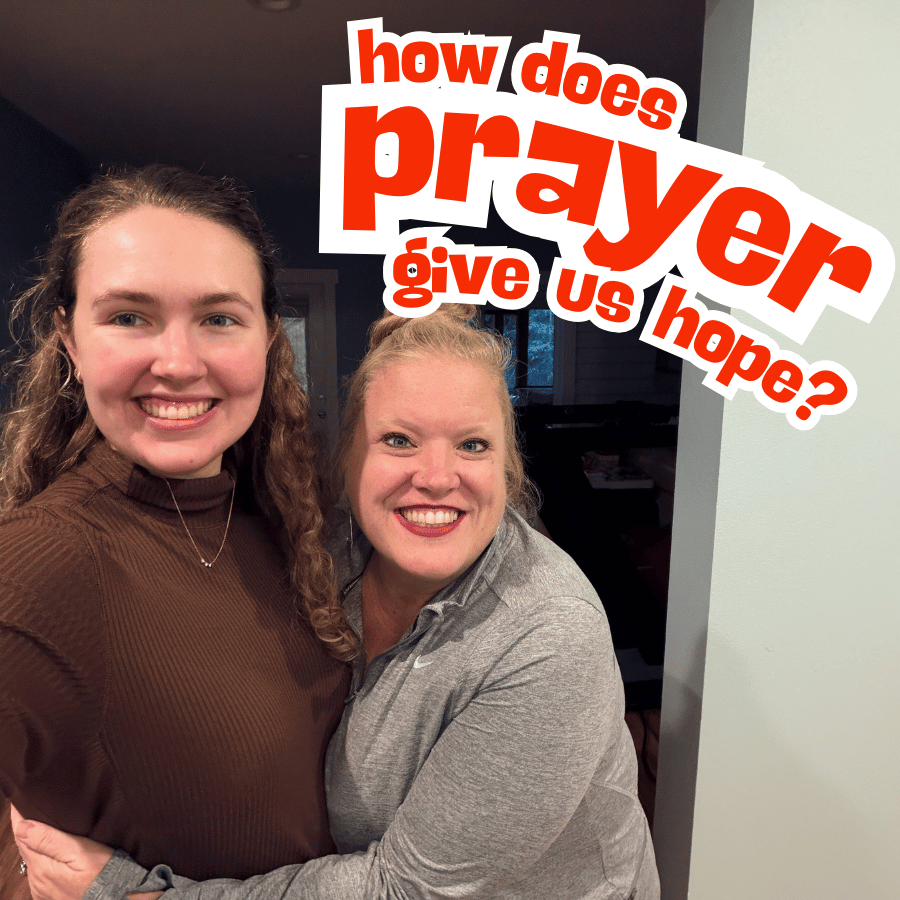Come to the Table
Written by Emma McCoy
5 minute read
Cover Artwork by Carol Aust: https://carolaust.com/carol/content/liturgical-paintings
When I was a child, I often wondered what was the point of having people over for dinner. I’d eat (politely as I could) until I was dismissed from the table, and then I’d go off and play. If the guests had children, I’d play with them. If they didn’t, I’d entertain myself until I was bored enough to peek around the corner and watch my parents at the table. Sometimes, the guests would be a married couple. Sometimes, they would be a few friends, or mentors, or people from church.
But no matter who was at the table, there would be conversation, and food, and lingering. As a child, I’d eat as fast as possible so I could go do something else.
Why would adults stay at the table for, like, ever, and keep talking?
Now, at twenty-two, I’m not going to claim that I know everything. In fact, the older I get, the more I’m sure that I’ll never know everything.
But what I can see better now is this: I love having people over for dinner. I love going over to people’s houses for dinner.
There’s something ritualistic and holy about cooking a meal, making sure all the parts are together and served, and welcoming friends to the table so we can eat together, laugh, and share bread and life. While I think the adults don’t have a lot figured out, sharing a meal is something that I can get behind. Just this last week I had two good friends over to my apartment, where we ate slightly dry chicken, crunchy brussel sprouts, and instant rice. I’m still working on my cooking. But we had a great time, laughing and eating together and making fun of each other, especially Meghan, who eats slower than anyone I’ve ever met. There is something in the breaking of bread that connects us to who we are and whose we are.
To eat together is to experience communion.
The fact that Spring Church eats a meal together as a part of worship is something I haven’t experienced anywhere else. And I wish this wasn’t the case. For the most part, other churches I’ve been to have followed the same format: show up, wait for service to start, go through the service, and maybe hang out afterward for a bit over coffee. And there’s nothing wrong with that, per se, but after spending years at Spring Church, I know it can’t be the full picture. What might it be like if churches ate breakfast together, or regularly had picnic lunches? I think it would be a lot harder to isolate on those difficult and dark days when you’re eating with your church—gathering over food is to be known, and to know.
I get to know my friends at Spring Church so well over the dinner table, talking and sharing and eating in a precious and holy half-hour. And I don’t think I’d be alone in saying that dinner is something I enjoy about Spring Church. In fact, if I can be allowed to speak for others, I’d say dinner is something the whole church loves. Warm soup, hunky bread, cookies crumbling in a glass bowl and a coffee machine chirping insistently in the background. Reading questions off Jessie’s colorful index cards and handouts, or simply catching up on the week. How’d the job interview go? Do you want more water? How’s your mother? This stew is good, isn’t it?
When eating with uncommon friends, the barriers that seem to divide us are both present and not. On the one hand, we’re all people sharing a meal, remembering the details about each other and touching base after a long week. On the other hand, this might be the first warm meal someone’s had with someone economically diverse, or the first time they’ve been looked in the eye and spoken to like an equal. It might be the first time someone’s been reminded that they’re powerless, and the privilege that structures their life—race, class, gender—isn’t actually as strong as they think it is.
So where would you go to have a meal like that? With someone experiencing homelessness, with an enemy, with a neighbor you’ve never spoken to? I think that church is the place for it.
The activities that Spring Church love doing (eating dinner together) also matter in a way supported by thousands of years of theology, tracing back to the Last Supper, if you so please. Or Passover, to go even more years back. Eating together as a rhythm, a ritual, matters for our spiritual formation as a community. It might seem a bit odd to a modern, western person at first—much like how I couldn’t understand why adults would throw dinner parties—but maybe we’re the odd ones. Maybe, over time, eating together is something that not only brings joy, but proves crucial.
Why would Jesus spend his last moments with his friends, over a meal? Why would he eat with betrayers, sex workers, and the disenfranchised? Sharing dinner must matter, even if it’s not clear from a first look.
So here we have the overlap of two things: something I like doing, and something that matters for me to do. If you replace “I” with “Spring Church,” that works too (and perhaps even better). Communion, dinner, a meal, a party, that precious half-hour.
But what does this have to do with how celebration is crucial for us to thrive? I’ve found that eating in community is celebration, even if the meal isn’t in itself a party. Even if there’s been tragedy. Even in the hard places. Because when we stop and break bread with one another, and dip cookies in milk and brew coffee and pour soup into mugs, we’re stopping the flow of work and saying, “I see you. I’m here with you.”
And that, friends, is a celebration in and of itself. We have a place where we can eat with uncommon friends. Where we can be discipled by people we find difficult. Where we can be faced with our own powerlessness. Where we can find friendship. Where all of this is a celebration.
That God desires our greatest flourishing is no secret: I could write ten thousand blogs tracing all the way through the Bible and exploring every nook and cranny of how much God wants for us to thrive. Unfortunately, I’m just one person. A person who has a deadline, and dinner to make, and approximately fifty books I need to read like, right now. But I can assure you this: God created us to be in fellowship with other people, and more often than not that looks like eating together—a celebration of life—whether it’s coffee with a friend or ice cream after work.
Maybe to child-me, sitting at a table and talking doesn’t sound like the most fun. But now, having a couple friends over and eating dinner and laughing sounds like the thing I’d like most.
Join us this Sunday for our Common Table Gathering, where we’ll be eating dinner together and talking about how the overlap between the things we like doing and the things that matter for us to do look a whole lot like celebration. And thriving.
So sit down with someone and eat this week, and see how things might shift afterward, and become a little bit brighter, and a little more joyful.


















3-minute read